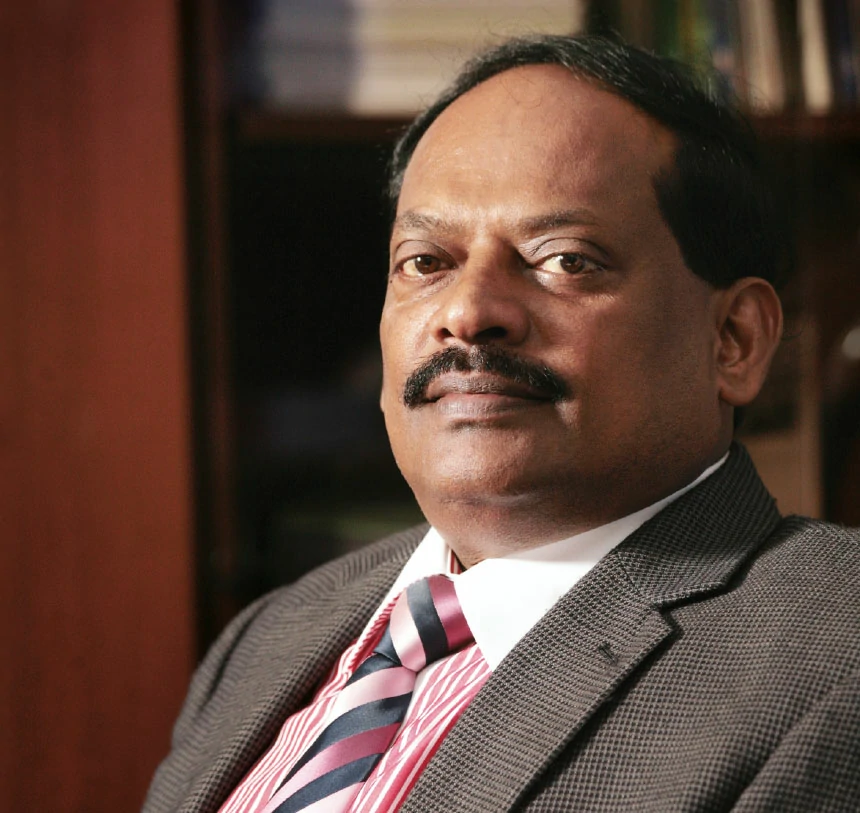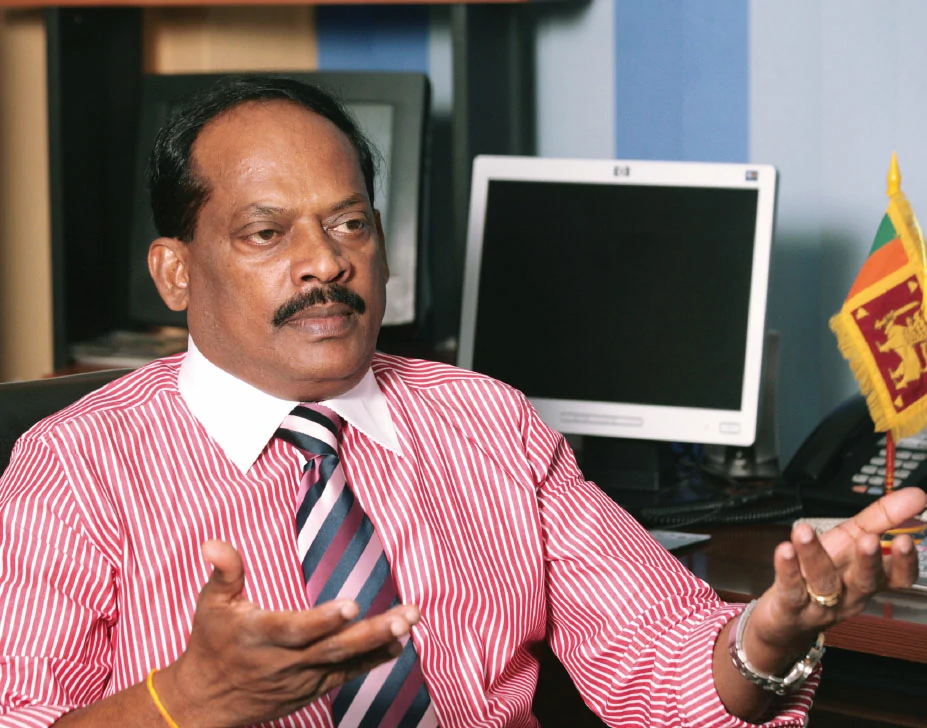
In the recent years, Dr E A Weerasinghe, the present Director General of the National Institute of Business and Management has steered the Institute to new heights of academic excellence. Rising above his humble beginnings, he has accomplished many milestones of academic achievements throughout his career. Honed by his well rounded background and experience, it is Dr Weerasinghe’s vision and foresight, which has been instrumental in realising the Institute’s own aspirations of being the best in Business and Management education. NIBM, a leading Institute in Business Education and training, providing much sought after courses to scores of students each year, celebrates its 40th Anniversary this year. Dr Weerasinghe speaks to Business Today on the Institute’s swift evolution to its new standing and what fuels its success in remaining a forerunner in an ever changing environment.
By Prasadini Nanayakkara | Photography by Menaka Aravinda
As the present Director General, you have been instrumental in making much needed changes to bring NIBM to its present standing, could you tell us about your background in the field of Economics and Management?
I was born and brought up in Galle as a simple village boy where I completed my primary education at Vidyaloka Maha Vidyalaya. I was selected to the Sri Jayewardenepura University where I did my Degree and also began my career, working as an assistant lecturer. Thereafter, I was awarded a British Council Scholarship to commence my Masters in computing at Bradford University in the UK. Since I wished to do further studies in Economics, I was fortunate to receive another scholarship from the Japanese Government and I completed a second Masters in Economics followed by a PhD from the Osaka University in 1997.
After working in the Universities of Japan, where I also held an Assistant Professorship position, I returned to Sri Lanka and at the end of December 2005, I accepted an invitation by Minister Piyasena Gamage, the Minister of Vocational and Technical Training and immediately assumed duties as the Director General of NIBM.
Running An Educational Institute Such As This Is No Easy Task, One Is Constantly Under Pressure But I Am Satisfied With All That Has Been Achieved Over The Past Few Years.
Could you give a brief history of NIBM and the changes that have been made in the past few years under your position as Director General?
NIBM is the pioneer institute in providing education in Management and IT. Forty years ago, it was the only institute that was conducting education and training for IT and Management but now there are numerous private institutes. NIBM was established in 1968 as a statutory body under the purview of the Ministry of Industries and Scientific Affairs in collaboration with the International Labour Organisation. At present the Institute functions under the Ministry of Vocational and Technical Training.
Although the Institute functions under the Ministry, it is self financed. Since we had to find our own capital expenditure, I realised that we needed to make some severe changes especially in terms of the physical environment and infrastructure. The Minister always understood and readily gave me the freedom to do what was required for the betterment of the Institute. As I came from the University, my educational background helped me. It’s not just about surviving this chair for the period that’s given to me. I did what was required of me for the sake of the development of this Institute. I took this upon myself as a challenge and I have no regrets.
Initially I took steps to upgrade its appearance by making major changes to its infrastructure. At the time, there was only a one storey building and this limited space was expanded to a five-storey building with all the facilities, redesigned to meet international standards. It was only with this expansion, we could accommodate 40-50% of the demand. After suitable changes, it has greatly been altered from what was there three years ago.
To provide an educational environment of reputable standards, NIBM is equipped with a fully fledged library and documentation centre with over 23,000 books, 400 CDs, educational video tapes and periodicals with reference and lending services for all the students. Apart from these changes I saw room for improvements in staff attitudes and coordination among them. We trained our personnel on how to manage time, provide quality customer service and to work better as a team.
What steps have you taken to ensure that the high standards of the Institute are upheld?
To ensure the quality of the programme, we constantly update them. We bring in local and international experts to make these changes. It is up to us to make sure that we produce students with employability. To this end, we always join with the corporate and private sector and customise our training according to their demands, we don’t offer the same traditional degree. The Governing Council and the Academic Advisory Board comprising of these experts revise the curriculum every six months. Ninety percent of the programmes are conducted in English medium and we provide not only the subject knowledge, we build attitudes that are suitable for the private sector. Many of our students go abroad as we train them according to an international standard.
Also we attracted and encouraged lecturers and consultants of high academic standing to come and work here through revised salary structures and attractive monthly and annual salary incentives. These well-qualified academics work here full time from 8:30 am to 4:30 pm and all the lecturers recruited are at least First Class degree holders from reputable universities. Therefore each and every consultant or lecturer, endeavours to provide better services.
Running an educational institute such as this is no easy task, one is constantly under pressure but I am satisfied with all that has been achieved over the past few years.
What are the programmes that are offered at NIBM?
We run about 200 programmes a year, from very short programmes of one or two days to four year programmes. They are, Foundation Programmes, Certificate, Advanced Certificate, Diploma, Higher Diploma and the degree courses. The programmes are designed to cater to all disciplines in management, like Human Resource Management, Business Management, Supervisory Management, Accounting and Financial Management, Production Management etc.
For many years now, we have had the Degree Programme in collaboration with the University College Dublin, Ireland. That is the BSc in Management and Information systems. Just recently we had the convocation ceremony of the 11th batch and 103 students graduated at the 2009 convocation.
Entry qualification for the degree programme is the A Level and they first enter into the Diploma course. We can now accommodate 250 students fully. Thereafter they can enter the higher diploma where only about 150 are selected from the 250. Once they complete the Higher Diploma, they can enter to the final year of the UCD degree. Almost all our students who follow the higher diploma find employment. Therefore the final year course is conducted part time, for a period of two years and altogether four years for the entire Degree Programme.
Our vision is to be the best education organisation in Sri Lanka and our mission is to produce well rounded professionals through a thorough hands on training and consultancy. We aim to give an education that fills all the gaps and moulds individuals with employability who can then be easily absorbed into a variety of job positions. We aim to serve a national interest in keeping with Mahinda Chinthanaya and UN Millennium Development Goals by evolving and developing our programmes according to the changing and varying needs of our country.
Some of the more recent inclusions made to our curriculum were the Language Units. School leavers and those in the public and private sector can enroll in English and Tamil language courses. Notably I believe there will be a lot of demand for the Tamil Language course especially by those in the public sector who will find it useful for their services in the North and East. A few programmes are conducted in Sinhala medium for the benefit of those in some government and private sectors who want to acquire academic qualifications to be eligible for promotions but do not have the ability to learn in English. On Saturday and Sunday, the lecture halls are filled with the working crowd. Additionally, Taxation, Insurance, Construction Project Management, Interior Design, and Facility Management are also on offer.
At the beginning of every year, we launch our prospectus to the corporate sector. All the pro-grammes that are on offer this year can be found in the Prospectus 2009, which are of international standards. Beginning of the year, we have a launching ceremony to which we invite all our clients. Companies can go through the new prospectus, select programmes and nominate their trainees.
The CEO Should Have The Vision And The Ability To Give The Correct Direction And Decision At The Suitable Time And Should Not Be Deterred By Temporary Setbacks.
Could you elaborate on the foreign affiliations with NIBM?
Apart from the affiliation with University College Dublin in Ireland, we also have formed affiliations with Limkokwing University in Malaysia and recently with Victoria University in Australia.
For 15 years now, we have had ties with the University College Dublin, Ireland. Recently we visited the Ireland National University and found it to be according to the international standards as they are within the 100 universities and is well recognised in Europe. It is a Commonwealth University, it is world recognised and they don’t have any affiliations with any other institution here in Sri Lanka. The programmes offered at University College Dublin focuses on providing a strong understanding and skills necessary for any area of Business and career development in Business.
We also joined hands with the Internationally renowned Limkokwing University of Creative Technology, Malaysia and now we conduct their courses, BSc (Hons) in Facilities Management, BSc (Hons) in Construction Management and Diploma in Interior Design locally. Recently the Victoria National University of Australia also agreed to be affiliated only with NIBM in Sri Lanka for the management degree, where the students can complete the first part here and complete the final two years in Australia and we will advertise for the first batch by the end of this year.
Apart from these affiliations six months ago a team from Korea Agency for Digital Opportunity & Promotion – KADO, of the Republic of Korea visited our premises. They have established digital international access centres in 14 countries in Asia and Europe. They selected Sri Lanka as the first country in South Asia after visiting many higher education universities, research centres and institutes in the region. Following a research over a period of 2 days, they decided to provide the centre to NIBM free of charge. We only had to provide the space for the access centre they modified and provided equipment worth nearly Rs 40 million comprising of Internet lounge, IT training lab with 30 brand new PCs, a 50 seat seminar room and administrative office. Anyone can come here and access the Internet and use the latest computer systems here.
The team of KADO recognised NIBM to be a prominent centre to provide the international access centre and this is a testament to the high standards that we provide at NIBM.
What are the other branches of NIBM?
Apart from the fully equipped, well-maintained five storey facility in Colombo, there are two other branches in Kandy and Kurunegala to deliver courses to the outstation students. The four storey training complex in Kurunegala was opened last year and this regional centre offers the same curriculum and award certificates up to Higher Diploma courses but all examinations are held at the Colombo Head office. At present the Kurunegala facility is also filled to capacity.
The certificate courses are conducted at the Kandy centre and students may come and enroll at the Colombo regional centre if they wish to progress to the Degree Programmes. These regional centres are a means of providing access to the programmes for students in neighbouring districts as well.
At present work is already in progress to construct a six storey building in Galle at an estimated cost of 725 million rupees on 130 perch premises.
We Aim To Give An Education That Fills All The Gaps And Moulds Individuals With Employability Who Can Then Be Easily Absorbed Into A Variety Of Job Positions.
What lies ahead for NIBM?
At present the Southern regional centre in Galle is in progress where two storeys are completed and we hope to open it next April prior to its completion for which we will have to earn further funds.
Importantly in the very near future we hope to obtain the Degree awarding status from the University Grants Commission. This process has been ongoing for the past 1.5 years and the final report has been submitted to the UGC and has been approved. NIBM will be the first institution to provide its own degree as a non-university institution. From the 22 institutes that participated, NIBM has succeeded in acquiring this status due to the high standards it offers in every aspect as an education institute.
This is very significant as we all know that from the 300,000 students that sit for the A Level, more than half qualify to enter universities but due to limited availability only 20,000 can enter the university. The rest are also qualified students as they have passed their examinations and parents are compelled to send these students abroad. In offering our own degree we can save a lot of money for Sri Lanka so this also serves a national interest.
For the degree awarding status, it is not only the quality requirements of the programmes but also our lecturers’ qualifications, quality of the syllabuses, library facilities, student advisory, counselling facilities, student welfare facilities, medical facilities, classroom availability and many more requirements were met. UGC is satisfied with the standards which are the same as those required by the local universities.
With the Southern Development Programme for the next 10 years, we hope to produce human resource, management and IT personnel to meet with the demands of those regions in future. With the North and East problems solved, we also hope to establish a regional centre in Jaffna and we are already in discussions about a suitable location.
Final thoughts?
This is a Government institution but a self financed institution, this is an example of a Government institution that can run smoothly without burdening the public. We earn our capital expenditure and pay our dues by ourselves.
That is how we have reached our goals and also by upholding good values like honesty, integrity and transparency in everything we do. In 2007 NIBM was the proud recipient of ISO 2001 and I also look forward to the National Quality Award with confidence. When I took office as the Director General three and half years ago, the Institute had recorded an operating loss of sixteen million rupees but now a forty three million surplus of income over expenditure has been recorded by the year 2008.
The CEO should have the vision and the ability to give the correct direction and decision at the suitable time and should not be deterred by temporary setbacks. If you are not wrong in your actions you have nothing to fear and you have to do what is required of you. As the Head of the institute the other staff members will also act correctly in following your example. Without their willing corporation and hard work, our dreams would not be a reality, so that is the secret of our Institution.







